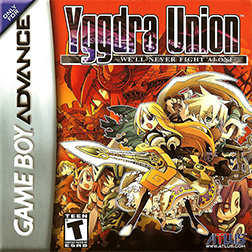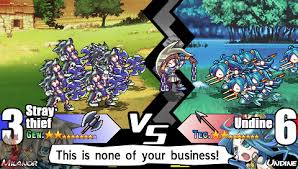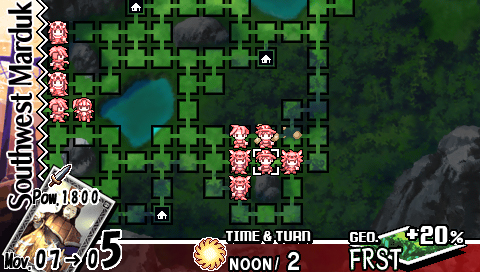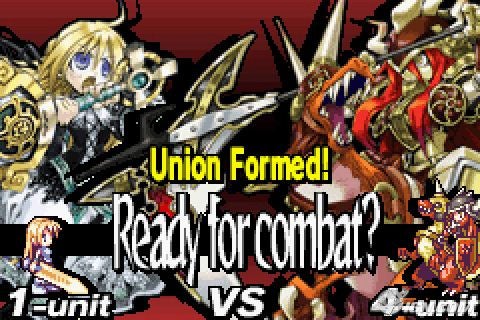Yggdra Union: We'll Never Fight Alone - My God, It's full of mechanics!
27/08/22

The final years of the Game Boy Advance brought us some of the weirdest, most impressive, and simply sublime titles that were unlike anything else from previous years. Seriously, pick a genre, and there was probably a game from around 2006 that was amongst the apex of the title on the platform. And whilst I don’t think today’s game is necessarily the best strategy RPG on the Game Boy Advance, it is without it’s most ambitious. Yggdra Union: We’ll Never Fight Alone is an ambitious, wide-ranging strategy RPG filled to the brim with systems, a deep, dramatic story and easy-to-learn, tough to master battle system whose depths feels almost abyss-like in depth. Whilst it’s not without its (draaaaaaawn ouuuuut) flaws, Yggdra Union is a worthy swan-song for the genre that, in my opinion, had the very best of times on the Game Boy Advance of any other.
Yggdra Union released in the twilight days of the Game Boy Advance, and due to that being beyond the years I was still playing my GBA, I’d never heard of it until I was looking up ‘underrated’ GBA games back last February when I was researching games for this website. With it’s own devoted fan base, strong enough for the game to receive several re-releases (on PSP, PC, and Switch in succession), beautiful sprite work and character art and the promise of a genuinely deep level of tactical, strategic action, Yggdra Union was one of the first games I threw onto my list, just waiting for a good time to finally play it. And Jesus Christ - I’m pretty glad I didn’t play it so early on, because good god is this game in-depth. Like, the kind of in-depth that makes Fire Emblem feel like ‘baby’s first SRPG’ in comparison.
Taking place in a fantasy world, Princess Yggdra of Fantasia (quite possibly equally the lamest and best fantasy place name I’ve ever seen) flees from her home after invasion from the Bronquian Empire, eventually finding safe haven in the company of Milanor, a bandit lord who serves as the bodyguard and vassal of the beleaguered princess. What follows is a tale of political intrigue, large-scale warfare and just enough fantastical fluff to fill out the experience. But the story - whilst perfectly serviceable - isn’t the appeal here. I doubt many people just picked Yggdra Union up off the shelf willy-nilly; they’re here for the hardcore, tactical strategy RPG action, and that is what Yggdra Union is, through and through.

Initially, Yggdra Union starts simple, feeling like a slightly more complicated version of Fire Emblem. At the beginning of each map, you’ll select a number of Skill Cards, each of which holds its own stats, including the amount of moves your army can make each turn. They do a bit more than that, but we’ll get there. Once per turn, you can select one of your characters to attack an opposing unit; don’t worry if only a single attack per turn sounds like a limitation - they’ve got you. Anyway, upon attacking, you’ll be transported to an Advance Wars-esque ‘clash’, where your troops literally smash into one another, before engaging in a back-and-forth where the weapon triangle and general strength reigns supreme. These encounters, at least at first, are fairly hands off, with your main form of interaction being a bar that can be filled by fighting ‘defensively’, lowering your attack, or spent by fighting ‘aggressively’, which will grant you a few moments of higher damage. Whoever loses these battles has, depending on various qualifiers like the power of a Skill Card, terrain, and how badly they were defeated, will reduce their Morale, which when depleted will result in that unit's defeat. These are the core of the main unit-battles, but we’re just getting started - hope you’re strapped in. Oh god.
Now, after a few maps, you’ll get the Union mechanic, which helps side-step the ‘limitation’ of only a single attack per turn. Each character, when engaging in combat, will be able to have companions join them in successive battles. Female characters will be joined by any characters standing directly vertically and horizontally adjacent to them, whilst male characters are the same, except in an ‘X’ shaped direction around them. Now, even if enemies can do this to you, it still seems pretty overpowered, putting three or more units against a single foe. Well, depending on how your target’s allies are positioned, they’ll send their allies into the successive battles involving your additional allies, though if you bring, say, three allies against two opponents, your third ally will battle the first opponent again, pushing the player to try and double or triple team your foes by isolating them. Once again, at first you’ll just be controlling your Aggressive/Defensive bar, but this bar takes a new form a few hours into the game. Yep, there’s even more to nail down, but we’re almost there (I think!)!

So, you know the Skill Cards I mentioned? Sure, they’re used to dictate your movement and strength on each turn, but they do, in fact, actually involve using said Skills. Around six maps into the game, you’ll gain access to the Skills system, adding yet another level of technical depth to the battles. Basically, upon playing Defensively to fill a battle bar up, you’ll be able to activate a skill based on the card you're using - as long as the ‘core’ member of the Union, the one you first attacked with - fits the criteria of the card. These skills range widely in usage - some will shield you from damage, or do a certain elemental attack to your foes. Some heal statuses, others cause it. Some of the strongest can even revive units, or take enemy items for your own. Enemies also have access to Skill Cards, usually only a single one, requiring you to time your usage and the gain/drain of your charge bar to work around them. Do you wait to shield at the last possible second, or turn it only early to soak in normal enemy attacks? It’s almost nail bitingly stressful - and I think that goes for the entire web of this game’s gameplay, but somehow, all this insanity just kind of… clicks.
Geez. Normally I don’t like to just explain how a game works, but Yggdra Union is one of those kinds of games where it’s required. I’ve basically just covered the basics of what the battle system of Yggdra Union is capable of, and for better or worse, you can whip up some genuinely befuddling strategies. If you’ve made it this far, let me spell it out for you; if you want a strategy RPG with the tactical depth of the Challenger Deep, this is the place for you. If you’re put off by such intricites, probably best to try one of the many, many other fantastic SRPGs on the GBA.
Otherwise, a lot of the overworld, grid-based gameplay has a lot in common with mainstays like Fire Emblem - moving units, visiting villages for dialogue, and performing objectives like capturing zones, defeating certain enemies and all that jazz. Surprisingly enough, secrets are dotted around most maps, usually ranging from finding an item on a random tile, to stumbling upon entire hidden zones of the battlefield, one of which led to an entirely new playable character. It’s a cool system to experience and explore the nooks and crannies of these battlefields, but at least for me, it does give me a minor bit of paranoia, worrying that I’m missing something by not going over each tile with a fine-toothed comb, a situation made worse when thanks to the Skill Card system, you only have a limited amount of moves per battle. Whilst at first many maps feel a bit small, Yggdra Union subverts thai by having multiple sub-battles on each battlefield, changing up the landscape and objectives on the fly. Really fond of this kind of thing, as it gives the impression of these battles being more wide-ranging and taking place on an actual battlefield that is constantly in flux, with reinforcements, ambushes, and all manner of events taking place. In the end, it’s not really a huge mechanical element of the game, but it does well to sell the experience of commanding a battle, if that makes sense.
Full disclosure, I played around six hours of Yggdra Union, and I can tell that this is a huge game, especially on our size-impaired system of choice, and so I didn’t get to experience the whole story, not by a long shot. But from what I did play, I really rather was taken with its narrative. It’s nothing insane, feeling a bit akin to the more ‘epic’ Fire Emblem titles, like Radiant Dawn or Geneology of the Holy War - a band of heroes, struggling against a seemingly overpowering foe, but there’s a lot of medieval intrigue, plot twists and all that to keep pulling me though. Don’t be misled - the in-depth, endlessly technical strategic gameplay is the main draw here, but the story is more than enough to pull one through. The character writing was a little flat for me, with most characters feeling rather tropey and one-dimensional, but they’re fine, and it’s helped the character design work for them is strong that I give a little more of a shit about them.
Whilst glancing at the game through the lens of a YouTube video might do this game a disservice, as its sprites don’t scale too well, but when played on a native resolution, this game is gorgeous. Its sprite work is near the apex of the GBA’s lifecycle, with beautiful character designs and a surprising amount of detail in the moment-to-moment battles. If you’re playing specifically the GBA version of the game, I recommend playing it on a smaller resolution, lest you play the game like me as a child, who stared at pixelated messes of GBA games the size of a PC monitor. The music isn’t quite on the level of the visuals, nothing bad, but the combination of long battles and relatively short loops on the soundtrack can make it sound a bit repetitive, and I frequently opted to just listen to a podcast as I played. Not just because of the looping music, but a bit more to do with what is, in my opinion, the biggest flaw of Yggdra Union.

Now, I love the tactical depth of this game. I love the clash-like battles, the technicality of the Union mechanics, and even the mind games that can make up the SKill Card system, but the crowning flaw that knocks Yggdra Union from the coattails of perfection is its pace. Now, I don’t know if I’m missing something, but everything in this game takes so LONG. Battles, especially featuring Unions of more than a couple of units, can take entire minutes to finish with little interaction, and the aforementioned skill card mechanic has animations that just seem to drag on and on, sometimes for very underwhelming effects. Whilst the game has all the necessities of the tactical RPG genre, like suspending your game, it really makes this game much harder to play in short spurts - I almost missed my bus stop waiting for skill card animations to end. Later versions of the game - on PSP, PC, and Switch, respectively - fixed this by giving battles a speed feature, but that isn’t helping me on the GBA, unfortunately. From what I’ve read, the recent PC/Switch remaster is more or less the ideal way to experience this game, so take all the good I’ve spouted regarding Yggdra Union and play it over there, and you’ve really got something special.
I think the other big issue with Yggdra Union is just how densely packed its mechanics and information are. Once unraveled, this game is a tactical RPG of staggering depth, but parsing all the information across equipment, skill cards and whatnot, and even with heavy tutorials can leave you in a bind as you might be making some notable mistakes - using consumables poorly, or leveling up terrible skill cards - that’ll screw you up further down the line. The early game of Yggdra Union is challenging - not overtly brutal, but still making you think about your moves less you cost your characters valuable morale.
Yggdra Union is likely without a doubt one of the most unique, well-polished, and technically demanding SRPGs on the GameBoy Advance. It's the kind of game that only really ever could’ve come out as a twilight jewel of the system. Its issues are notable, but they exist more as a reality of its age and in comparison to its far more modern re-releases. Its sheer mechanical scale might - understandably so - put off some of y’all less attuned with this genre, but if you’re willing to put the time in, Yggdra Union may easily become a favorite.
Thank you so much for reading my review of Yggdra Union: We’ll Never Fight Alone! This was a tough one to write, honestly - it’s such a big, deep game that it’s genuinely difficult to give my thoughts on it. I don’t think it’s my best work, but that’s okay. Anyway, the next few games will be a lot smaller in scale just so I avoid dealing with a game this big. As always, you can email me either at mgeorge7003@hotmail.com or cckaiju@gmail.com if you have any questions or requests. Thanks again for reading, and I’ll see you in my next review!
